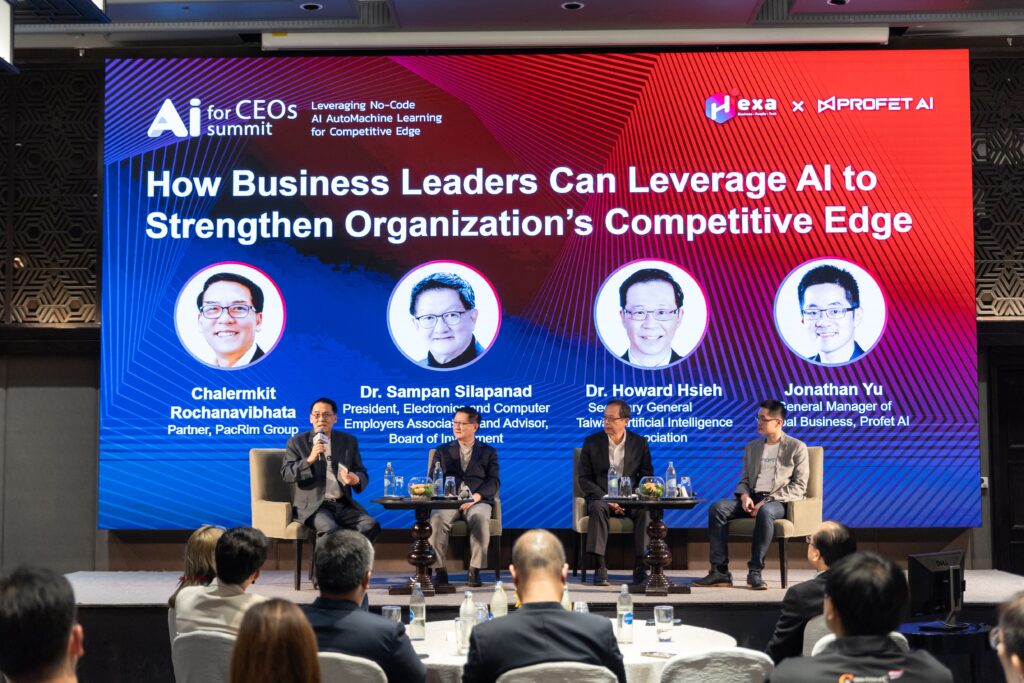Amid growing global economic uncertainty, Profet AI Co-founder and CEO Jerry Huang reflected, “Since 2022, we have traveled across Asia and, through exchanges with numerous companies, deeply felt the pressure and challenges they face in talent upgrading and global expansion. These businesses urgently need to understand how AI can help them proactively deploy strategies and make critical decisions. This experience has strengthened my belief that our 2022 Crossover Talks: AI & the Economic Cycle series was crucial in helping companies identify opportunities amid economic cycles.”
Pain Points and Critical Analysis: Hsing-Chien Tuan and Dr. Chia-Yen Lee Discuss Transformation Strategies at Crossover Talks
In Crossover Talks: AI & the Economic Cycle, Hsing-Chien Tuan, Honorary Chairman of Innolux Corporation, highlighted that even in downturns, businesses should focus on automation, IoT, big data, and AI. He stressed, “Identify pain points with precision, articulate them scientifically, and set meaningful indicators.” Dr. Chia-Yen Lee of NTU added that AI must now be integrated beyond manufacturing into R&D, advising businesses to understand core strengths, explore global and cross-industry expansions, and embrace disruptive technologies.
Dr. Chia-Yen Lee, from the Department of Information Management at NTU, offered profound insights from both academic and practical perspectives. He stated, “Recently, while consulting with semiconductor manufacturers, I often mention that we used to only need to modify the manufacturing site, but now we need to involve AI, even in research and development, and the future potential may be even greater.” Dr. Lee proposed four key actions: first, businesses should deeply understand their core competencies and invest in key areas; second, when expanding, consider international layout and cross-industry expansion; third, explore new markets through geographic expansion; and finally, integrate disruptive technologies and establish new businesses or services through mergers and acquisitions, while paying attention to retaining talent and ensuring the long-term value of technology.
Dr. Lee further suggested that businesses should embark on their AI journey from five aspects: accelerating time (building a digital nervous system), increasing efficiency (promoting digital transformation and intelligence), improving quality (building a learning organization and strengthening education and training), increasing revenue (achieving production-sales balance), and reducing costs (reducing variation and risk).
Asia-wide Consensus Spanning Two Years: PacRim Group Shares the Inevitability of AI Transformation from a Thai Perspective
This perspective extends across Asia. At the 2024 AI Leadership Summit in Bangkok, Porntip Iyimapun, CEO of PacRim Group, a pioneer in global leadership development and cultural transformation with nearly 30 years of experience, presented similar views: “Digital transformation, leadership transformation, and corporate culture transformation are all important parts of the same plan. The introduction of AI is inseparable from these transformations. Thai enterprises need to make comprehensive adjustments in these areas to successfully integrate AI into their business strategies. Without adopting AI, enterprises will gradually be eliminated.” It not only reflects PacRim Group’s professional insights in leadership development and cultural transformation but also confirms the core position of AI in modern enterprise transformation.
AI Helps Businesses Address Economic Challenges and Future Growth
In Profet AI Crossover Talks, multiple companies shared successful cases of using AI tools. Brandon Yeh, Vice Chairman of De Licacy, shared how AI can be used to achieve technology transfer and solve talent recruitment difficulties. Richard Hsieh, Associate Manager of Kuan Yuan Paper, introduced an innovative management method combining OKR, zero errors, and AI. Kenny Chiu, Deputy General Manager of Shuttle Service, shared the experience of using AI to predict and reduce employee turnover.
These cases clearly demonstrate the application potential of AI in various industries and fields. From manufacturing process optimization to human resources management, AI is helping businesses address various challenges, improve efficiency, reduce costs, and prepare for future growth.

